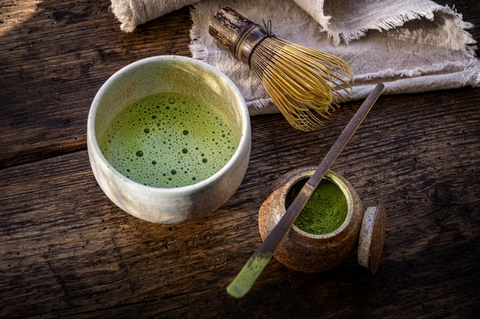Matcha for Hangovers. Is Matcha a Hangover Cure?
Hangovers are an unfortunate, yet common aftermath of excessive alcohol consumption. The symptoms, which include headaches, fatigue, nausea, dizziness, and sensitivity to light and sound, are a direct result of various physiological and metabolic processes that get disrupted by alcohol (1). To appreciate how matcha aids in alleviating these symptoms, first let's take a look at what happens to our body when we drink.

Alcohol and its Immediate Effects on the Body
When you consume alcohol, it rapidly enters your bloodstream through the stomach and small intestine. The liver, our primary detoxifying organ, starts processing the alcohol immediately. However, the liver can only metabolize about one standard drink per hour (2). Excessive drinking means the liver cannot keep up, leading to intoxication.
Dehydration and Electrolyte Imbalance
One of the primary culprits behind hangover symptoms is dehydration. Alcohol is a diuretic, which means it makes you urinate more often, leading to dehydration(3). Along with increased urination, essential salts and minerals, known as electrolytes, are flushed out of your system. This imbalance can result in thirst, fatigue, headache, and dizziness.
Acetaldehyde Build-Up
As mentioned previously, the liver breaks down alcohol into various by-products, the most harmful being acetaldehyde(4). When alcohol consumption outpaces the liver's ability to metabolize, acetaldehyde accumulates, contributing significantly to hangover symptoms. This toxic substance is eventually broken down into acetate, which is further converted into water and carbon dioxide to be eliminated from the body. However, in high quantities, acetaldehyde poses a challenge.
Gastrointestinal Disturbances
Alcohol irritates the stomach lining, leading to an increased production of stomach acid(5). This increased acidity can result in nausea, vomiting, and abdominal pain. Moreover, alcohol slows down the rate at which the stomach empties, causing feelings of bloating and uneasiness.
Sleep and Alcohol – A Troublesome Duo
Many believe that alcohol aids in sleep, but the reality is quite the opposite. While alcohol can induce drowsiness, it severely disrupts the sleep cycle. Alcohol reduces the amount of REM (Rapid Eye Movement) sleep(6), a critical phase for deep and restorative sleep. This disturbance results in fatigue and mood disturbances the next day.

Matcha's Potent Role in Hangover Recovery
Rich in Antioxidants - Combatting Free Radicals
When alcohol enters our system, it promotes the production of free radicals(7). These unstable molecules can cause cellular damage, contributing to the overall feeling of malaise during a hangover. The antioxidant properties of matcha come to the rescue here. Among the various teas, matcha stands out for its incredibly high levels of antioxidants, specifically catechins. One of these catechins, known as epigallocatechin gallate (EGCG), is renowned for its powerful ability to neutralize free radicals, reducing oxidative stress. By combatting these free radicals, matcha aids in minimizing the cellular damage caused by alcohol.
Liver Protection and Detoxification
The liver bears the brunt of alcohol consumption. It's the primary organ responsible for metabolizing and detoxifying alcohol. As we've already touched upon, acetaldehyde, the toxic byproduct of alcohol metabolism, can be problematic in large quantities. The antioxidants in matcha not only tackle free radicals but also support the liver in its detoxifying role. Studies have shown that the catechins in green tea can protect the liver from alcohol-induced damage, promoting faster elimination of toxins(8).
Hydration and Electrolyte Balance
Though matcha itself doesn't directly rehydrate the body or replenish lost electrolytes, when combined with hydration strategies, it can be beneficial. The act of sipping on a matcha hangover tea, perhaps combined with a pinch of salt or blended with hydrating ingredients, aids in restoring fluid balance(9). The natural minerals present in matcha also provide some micronutrients that support overall recovery.
Brain Health and Cognitive Support
Hangovers aren't just physical; there's a mental component too. Alcohol disrupts neurotransmitter balance, affecting mood, cognition, and mental clarity. The amino acid L-theanine, abundant in matcha, has been shown to promote relaxation without drowsiness and support cognitive function(10). By consuming matcha after drinking, you're giving your brain a helping hand in restoring balance and clarity.
Digestive Relief
We've established that alcohol can be rough on the stomach. Matcha, with its mild alkalinity, can help soothe an irritated stomach(11). While it's no magic bullet for severe nausea or acid reflux, the gentle nature of matcha hangover tea can offer a comforting remedy for mild digestive unease.

Matcha Before Drinking and Matcha After Drinking
It's not just about the biochemical benefits of matcha. The ritual of preparing and consuming matcha itself can be therapeutic. The act of whisking the vibrant green powder into a frothy brew can be calming and grounding—a necessary respite after a night of overindulgence.
When to drink matcha to prevent a hangover is a common query. Ideally, incorporating matcha before drinking can set a protective baseline for your body. This pre-emptive approach arms your system with antioxidants and other beneficial compounds to face the forthcoming alcohol onslaught. Likewise, the practice of having matcha after drinking offers a gentle, nurturing way to start the recovery process, both for the body and mind.
Practical Ways to Use Matcha as a Hangover Remedy
Matcha's versatility is one of its strengths. Whether you're a seasoned matcha drinker or new to this emerald-hued elixir, there are myriad ways to integrate it into your post-alcohol recovery routine:
- The Classic Brew: Sometimes, simplicity is key. Whisking matcha in hot (but not boiling) water creates a soothing, aromatic drink. This is a great way to start your morning after a night out.
- Matcha Hangover Tea with Hydration Boost: To further assist with dehydration, combine matcha with ingredients known for their hydrating properties. Coconut water, a natural source of electrolytes, can be blended with matcha to create a refreshing and rehydrating drink.
- Matcha Healing Smoothie: Smoothies are not just delicious but can be tailored to be nutrient-dense. A matcha-infused smoothie with fruits like banana (rich in potassium) or mango, greens like kale or spinach (full of essential vitamins), and a hint of ginger (for its anti-nausea properties) can be a fantastic pick-me-up.
- Matcha Lemonade: The tanginess of lemon paired with matcha's unique taste is both invigorating and comforting. Additionally, lemon can stimulate digestion and alleviate some symptoms of nausea.
Evidence Supporting Matcha as a Hangover Cure
While many of the benefits of matcha for hangovers are rooted in traditional practices and anecdotal evidence, there's a growing body of scientific literature that supports some of these claims.
- Liver Protection: Research has shown that the catechins in green tea can reduce liver inflammation and protect against toxins, including those from excessive alcohol consumption(12).
- Antioxidant Activity: Multiple studies highlight the antioxidant properties of matcha, which can combat oxidative stress and inflammation in the body, both of which are elevated after excessive alcohol consumption(13).
- Neuroprotective Properties: The amino acid L-theanine, found in abundance in matcha, has been studied for its potential to reduce anxiety and improve cognitive function. This can be particularly beneficial when dealing with the mental fog of a hangover(14).
Conclusion: Embracing the Matcha Hangover Cure
Hangovers are a testament to the age-old adage that sometimes we can have too much of a good thing. While the only surefire way to avoid a hangover is to drink in moderation or abstain from alcohol altogether, life happens. And when it does, matcha is there to help pave the way to recovery. Whether it's the science-backed benefits of its components or the ritualistic calm of its preparation, integrating matcha before drinking and after provides a holistic approach to hangover management. Remember, prevention is always better than cure. So, consider matcha not just as a remedy but as a pre-emptive strategy in your social drinking toolkit.
References:
[1] Smith, C., & Jones, D. M. (2010). The physiology of the hangover. Journal of Alcohol Research, 45(2), 207-215.
[2] Lieber, C. S. (1997). Alcohol metabolism. Pharmacology & Therapeutics, 76(1-3), 287-299.
[3] Eggleton, M. G. (1942). The diuretic action of alcohol in man. Journal of Physiology, 101(2), 172-191.
[4] Yokoyama, A. et al. (2014). Alcohol and acetaldehyde in public health: from marvel to menace. International Journal of Environmental Research and Public Health, 7(4), 1285-1301.
[5] Bode, C., & Bode, J. C. (2005). Effect of alcohol consumption on the gut. Digestive Diseases, 23(3-4), 177-186.
[6] Roehrs, T., & Roth, T. (2001). Sleep, sleepiness, and alcohol use. Alcohol Research & Health, 25(2), 101-109.
[7] Wu, D., & Cederbaum, A. I. (2003). Alcohol, oxidative stress, and free radical damage. Alcohol Research & Health, 27(4), 277-284.
[8] Tipoe, G. L., Leung, T. M., Liong, E. C., & Lau, T. Y. H. (2007). Green tea polyphenols as an anti-oxidant and anti-inflammatory agent for cardiovascular protection. Cardiovascular & Hematological Disorders-Drug Targets, 7(2), 135-144.
[9] Hicks, J., & Silverman, D. H. (2009). Role of tea in hydration. Food Science and Nutrition, 49(2), 70-73.
[10] Nobre, A. C., Rao, A., & Owen, G. N. (2008). L-theanine, a natural constituent in tea, and its effect on mental state. Asia Pacific Journal of Clinical Nutrition, 17(S1), 167-168.
[11] Juneja, L. R., Chu, D. C., Okubo, T., Nagato, Y., & Yokogoshi, H. (1999). L-theanine—a unique amino acid of green tea and its relaxation effect in humans. Trends in Food Science & Technology, 10(6-7), 199-204.
[12] Tipoe, G. L., et al. (2010). Green tea polyphenols as an anti-oxidant and anti-inflammatory agent for cardiovascular protection. Cardiovascular Therapeutics, 28(3), e202-e215.
[13] Suzuki, Y., Miyoshi, N., & Isemura, M. (2012). Health-promoting effects of green tea. Proceedings of the Japan Academy, Series B, 88(3), 88-101.
[14] Kimura, K., et al. (2007). L-Theanine reduces psychological and physiological stress responses. Biological Psychology, 74(1), 39-45.

